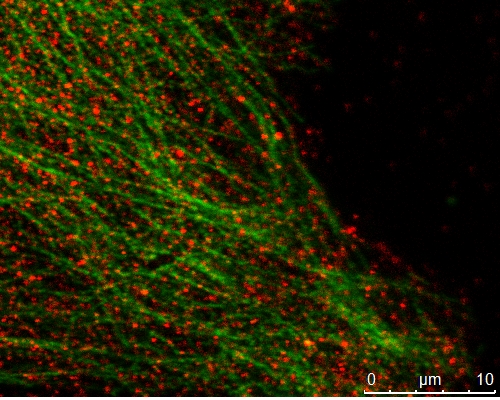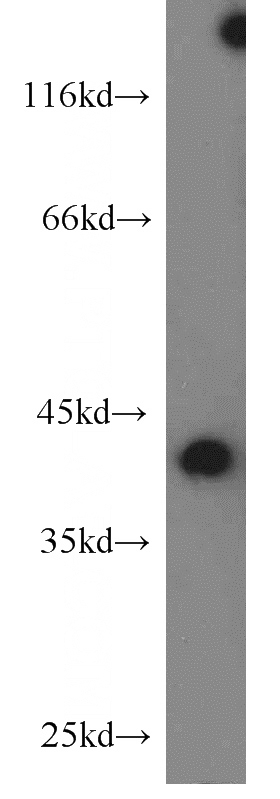-
Product Name
MAPRE2 antibody
- Documents
-
Description
MAPRE2 Rabbit Polyclonal antibody. Positive IF detected in mouse cells. Positive WB detected in K-562 cells, Jurkat cells. Observed molecular weight by Western-blot: 39-42 kDa
-
Tested applications
ELISA, WB, IF
-
Species reactivity
Human,Mouse,Rat; other species not tested.
-
Alternative names
APC binding protein EB2 antibody; EB1 antibody; EB2 antibody; End binding protein 2 antibody; MAPRE2 antibody; RP1 antibody
-
Isotype
Rabbit IgG
-
Preparation
This antibody was obtained by immunization of MAPRE2 recombinant protein (Accession Number: NM_014268). Purification method: Antigen affinity purified.
-
Clonality
Polyclonal
-
Formulation
PBS with 0.1% sodium azide and 50% glycerol pH 7.3.
-
Storage instructions
Store at -20℃. DO NOT ALIQUOT
-
Applications
Recommended Dilution:
WB: 1:200-1:2000
IF: 1:50-1:500
-
Validations

Mouse keratinocyte showing MAPRE2 (#Catalog No:112444, 1:100 dilution, with Alexa 594 labelled 2nd Ab) in red and alpha-tubulin (#Catalog No:, 1:100 dilution, with Alexa 488 labelled 2nd Ab) in green.

K-562 cells were subjected to SDS PAGE followed by western blot with Catalog No:112444(MAPRE2 antibody) at dilution of 1:500
-
Background
RP1 protein shares significant homology to the adenomatous polyposis coli (APC) protein-binding EB1 gene family and binds specifically to the C-terminal region of the APC protein. RP1 also binds directly to tubulin, both in vitro and in vivo. The function of RP1 is currently unknown; however, its homology suggests involvement in tumorigenesis of colorectal cancers and proliferative control of normal cells. It may belong to the intermediate/early gene family, involved in the signal transduction cascade downstream of the TCR.
Related Products / Services
Please note: All products are "FOR RESEARCH USE ONLY AND ARE NOT INTENDED FOR DIAGNOSTIC OR THERAPEUTIC USE"
